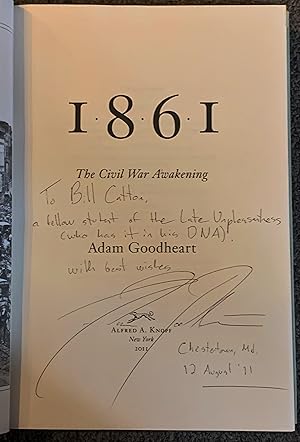

“Well, let them come, those minions of the North,” wrote one Virginian in a letter to the Richmond Dispatch on May 18. Many Confederates, however, had already expressed relish at the prospect of slaughtering their former countrymen. They preferred to think of Southerners in the terms that Lincoln would use throughout the war: as estranged brethren, misled by a few demagogues, who needed to be brought back into the national fold. Yankees talked big about sending Jeff Davis and other secessionist leaders to the gallows, but almost never about shooting enemy soldiers. For the first month of the war, some had assumed that the war would play out more or less as a show of force: Union troops would march across the South and the rebels would capitulate. Indeed, it was perhaps Ellsworth’s death, even more than the attack on Sumter, that made Northerners ready not just to take up arms, but to kill. Across America, Ellsworth’s death released a tide of hatred, of enmity and counter-enmity, of sectional bloodlust that had hitherto been dammed up, if only barely, amid the flag-waving and patriotic anthems. Within the four weeks after Ellsworth’s death, some five times that number would enlist.Ī torrent of emotion, penned up during the anxious weeks since Sumter’s fall, had been released, pouring out for a dead hero who had never fought a battle, but was rather, as one newspaper put it, been “shot down like a dog.” There was more to the response than just 19th-century sentimentality, more than just patriotic fervor. At the beginning of May, Lincoln had asked for 42,000 more volunteers to supplement the militiamen called up in April. Army recruiting offices were mobbed as they had not been since the first week of the war. Here is how Goodheart portrays the aftermath of Ellsworth’s death:īy the following evening, public gatherings in New York and other major cities offered grandiloquent testimonials and took up collections for the support of Ellsworth’s parents, left destitute by the death of their only child. In his new book, 1861: The Civil War Awakening, Adam Goodheart explains that Ellsworth was not merely a surrogate little brother to Lincoln, but also an exemplar of the romantic idealism that characterized the generation of Americans that came of age in the 1850s. The innkeeper was immediately gunned down by one of Ellsworth’s men the colonel became the first Union officer to die in the Civil War. Elmer Ellsworth of the 11th New York Volunteers.

The next day, an enraged innkeeper there fired a shotgun point-blank into the chest of Col. President Abraham Lincoln ordered troops to occupy the port city of Alexandria. On May 23, 1861, Virginia seceded from the Union.


 0 kommentar(er)
0 kommentar(er)
